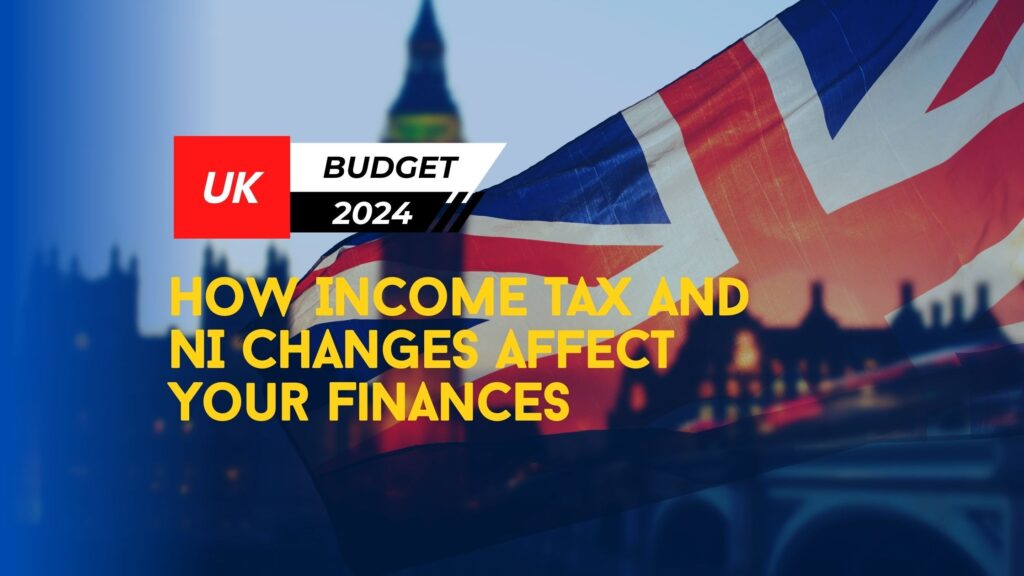The UK Budget 2024 brings significant updates to Income Tax and National Insurance (NI), impacting both employees and businesses. Key changes include revised NI contribution rates for businesses and adjustments to tax thresholds that may affect take-home earnings. Our guide explains these changes and provides practical tips on how they may affect your finances.
What Are Income Tax and NI Thresholds?
Income tax and NI thresholds determine the rate you pay based on your earnings. Typically, these thresholds increase with inflation to prevent “bracket creep,” where higher wages push individuals into higher tax brackets, leading to higher tax bills even if their purchasing power doesn’t increase.
In Budget 2024, thresholds for income tax and NI will stay frozen until 2028-29. From that point, thresholds will adjust annually with inflation to prevent more people from entering higher tax bands as incomes rise over time.
Impact of Frozen Income Tax and NI Thresholds
The freeze on income tax and NI thresholds until 2028-29 has several effects:
- Bracket Creep: As wages increase, individuals may find themselves in higher tax brackets, even if their actual purchasing power hasn’t improved.
- Stealth Tax Impact: The freeze increases tax liabilities without raising tax rates directly. For example, while a salary increase from £40,000 to £45,000 does not push someone into a higher tax bracket, continued salary growth could eventually lead to crossing the £50,270 threshold, resulting in higher tax payments despite modest income increases.
How the Income Tax and NI Changes Will Affect Your Take-Home Pay
With frozen thresholds, take-home pay could be affected over time, as income growth could lead to higher taxes. Here are some strategies to help:
- Salary Adjustments: Consider salary sacrifice schemes, which let you reduce taxable income by directing part of it toward benefits like pensions, childcare vouchers, or ultra-low-emission cars.
- Pension Contributions: Increasing pension contributions through salary sacrifice can reduce your taxable income and lower overall tax liabilities.
- Regular Financial Planning: Assess your finances regularly to stay ahead of any tax changes and make adjustments as needed.
Get an Accountant
Whether you’re self-employed or own a limited company, we can provide you expert accountancy support.
View PlansWhatsApp UsHow Higher National Insurance Contributions Will Affect Employers
Starting in April 2025, employers will see an increase in National Insurance contributions (NICs) from 13.8% to 15%. The threshold for paying NICs will also drop from £9,100 to £5,000.
- Increased Costs for Employers: Employers will pay an additional £865.80 in National Insurance for each employee earning £30,000, raising the total cost of that employee from £32,884.20 to £33,750. This significant increase adds financial pressure on companies, particularly small and medium enterprises, which may need to reconsider pay increases or hiring plans.
- Employment Allowance Increase: To support small businesses, the Employment Allowance will rise from £5,000 to £10,500. As a result, about 865,000 small businesses will not pay any National Insurance next year, while around one million more may see no change or a decrease in their NIC obligations.
Employers will need to review their financial strategies and workforce plans to manage the increased costs. They should also consider the support available, such as the Employment Allowance.
Financial Strategies to Prepare for These Tax Changes
Here are some actionable strategies to help manage the impact of these changes:
- Utilise Salary Sacrifice Arrangements: These arrangements, such as pension payments and childcare vouchers, reduce taxable income, helping both employees and businesses to manage tax costs.
- Explore Tax-Efficient Business Structures: Businesses with Family Investment Companies (FICs) or Personal Investment Companies (PICs) may want to review how they distribute income, potentially favouring dividends over salary.
This guide highlights the main changes in the UK Budget 2024 that could affect income tax, NI, and your overall finances. However, there may be other measures that impact your situation, and other tax-saving strategies. For personalised advice and a full understanding of how these changes might affect you, speak with a professional adviser or book a free consultation with us.
Frequently Asked Questions
How long will the income tax and NI thresholds remain frozen?
The Income Tax and National Insurance (NI) thresholds will remain frozen until the 2028-29 tax year. After this period, they will adjust annually with inflation to help prevent more people from moving into higher tax bands as incomes rise over time.
How do I know if I'm paying the correct amount of Income Tax?
To make sure you’re paying the right amount of income tax, start by checking the tax code on your payslip. This code shows your tax-free allowance; if it’s incorrect, you may be paying too much or too little tax. You can also use HMRC’s tax checker tool to estimate your tax based on your income. Lastly, make sure your deductions match your earnings by comparing your payslips to your P60 form each year.
How do I claim a tax refund if I've overpaid?
If you’ve overpaid tax, you can claim a refund in a few ways. First, you can use your Personal Tax Account on the HMRC website to submit an online claim. Also, you can complete the R40 form and send it to HMRC by post. If you file a self-assessment tax return, you can include the overpayment details in your return, and HMRC will process the refund accordingly.
What happens to my National Insurance contributions after reaching State Pension age?
After reaching State Pension age, you no longer need to pay Class 1 (employee) or Class 2 (self-employed) National Insurance contributions. But, if you are employed, your employer will still continue to pay their portion of National Insurance contributions.
How can I check my National Insurance record?
You can view your National Insurance record by logging into your Personal Tax Account on the GOV.UK website. You can also request a statement by completing form CA3916 and sending it to HMRC by post.
What are the current National Insurance rates?
For the 2024/25 tax year, the National Insurance rates are:
Employees (Class 1):
- 13.25% on earnings between £242 and £967 per week.
- 3.25% on earnings above £967 per week.
Employers:
- 15.05% on earnings above £175 per week.
Self-Employed (Class 4):
- 9% on profits between £12,570 and £50,270 per year.
- 2% on profits over £50,270 per year.

